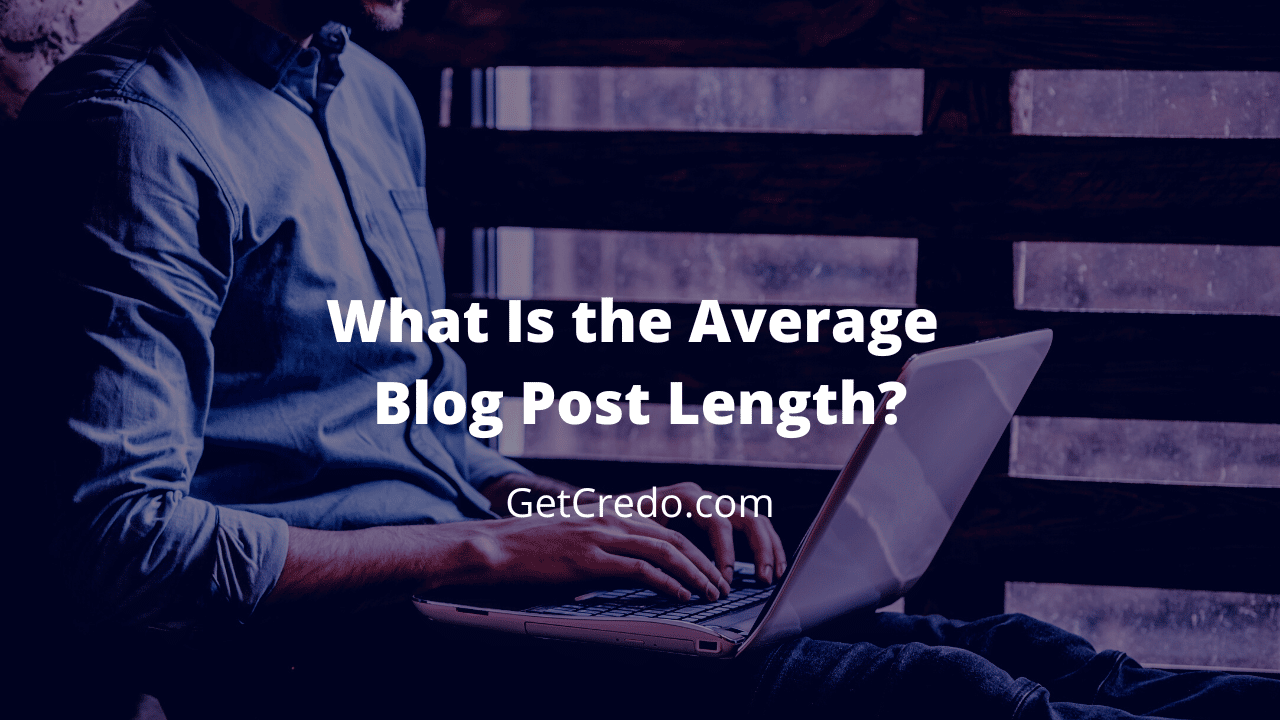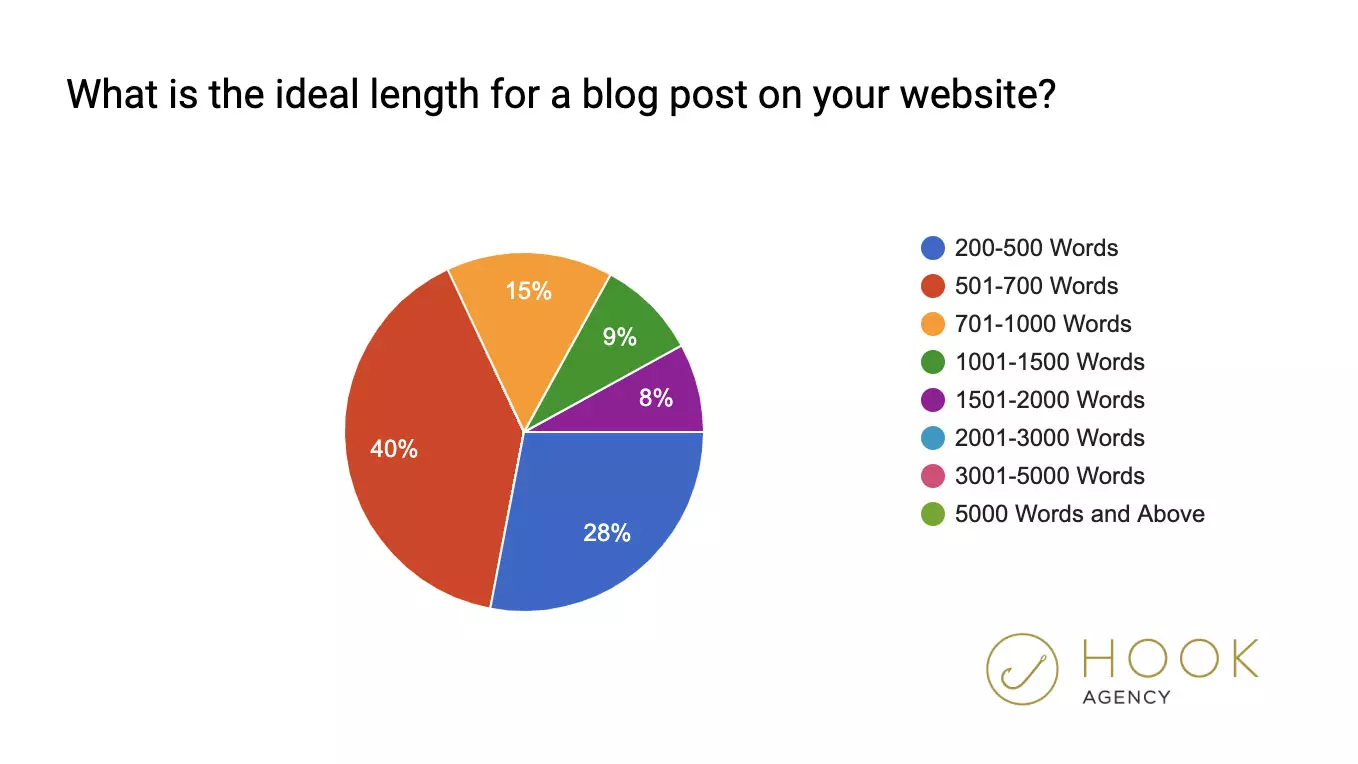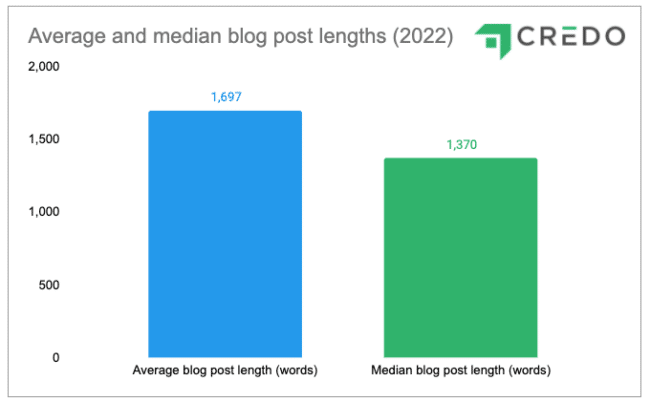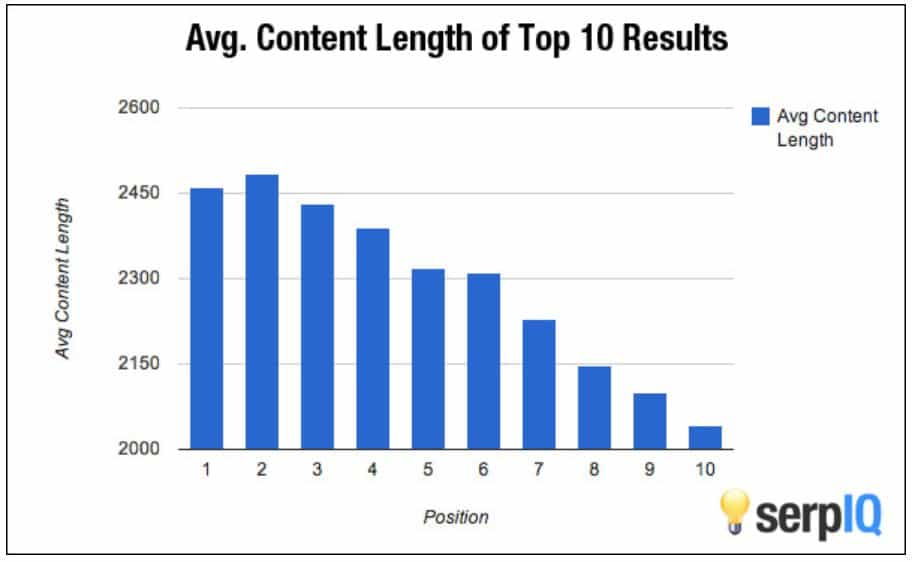Each year, there are numerous studies, surveys, white papers, and more that aim to identify the average blog post length for that specific year.
This is a fair and frequent question and one that digital agencies, digital marketers, and businesses struggle to nail down with a concrete number.

Some of these studies are better than others but, generally, they do not come to the same exact conclusion.
Much of the dissent is likely due to various interpretations of Google’s algorithm updates (Panda to Penguin back in 2012), catering to different audiences and users, and the assumption that there is a one-size-fits-all approach to blog length.
“It is better to write long-form content because Google prefers longer posts,” many argue.
Others feel that shorter, more succinct posts may better suit today’s readers and their ever-declining attention spans. A recent poll conducted by Hook Agency highlights the stark differences in beliefs on this topic.

Understandably, many assume a higher bounce rate for a 1,800-word post than for a short and sweet 600-word post. People go back and forth and that conversation will continue for as long as we are all out here trying our best to serve up exactly what our reader’s want.
And by “what our readers want”, that is to say – what Google wants. These things, as far as Google intends, are one in the same.
In the end, that’s no kind of answer so we ran our own survey in order to publish the results here for you.
Table of Contents
First, Let’s Define Various Blog Post Lengths
Joe Bunting, a WSJ best-selling ghostwriter, provides an excellent synopsis of blog post lengths and purpose:
- Microcontent: 75–300 words. Super-short posts are best for generating discussion. They rarely get many shares on social media, and they’re horrible for SEO, but if you want a lot of comments, write short posts!
- Short-form content: 300–600 words. This is the standard blogging length, recommended by many “expert” bloggers. Shorter blog posts are a good middle-ground for social shares and comments but are too short to gain much authority or search traffic.
- News article-length content: 750 words. This is the standard length for professional journalism, especially in newspapers. I find that it’s pretty good for getting links from other bloggers and shares on social media.
- Mid-form content: 1000–1500 words. You’ll get fewer comments at this length, but a lot more shares on social media, especially if you’ve followed the advice above and written a piece of content that actually solves someone’s problem. That being said, I’ve written posts this long and gotten 100+ comments, so it really depends on the topic and your audience.
- Long-form content: 2,450 words. The highest-ranking articles on Google are most often 2,450 or more average word count. If you want to have a top-ranking post that can become evergreen on search engines (and thus get thousands of new readers per month, year after year), this is the best length to write. However, make sure you do your keyword analysis to write about a topic that people are actually searching for (I use Ahrefs for this). It would be a shame to write a book-length long-form blog post on a topic no one ever searches for!
Research Methodology For Our Survey
Instead of just going and finding a bunch of random blog posts, John (Credo’s CEO and founder), leveraged his robust Twitter following to get information directly from other marketers and business owners.
Wisely, he asked for links from a diverse set of website owners so that the numbers would be as accurate as possible and not specific to one industry or niche. This could skew the data as respondents running ecommerce websites will likely have shorter, less research-intensive posts than a subject matter expert on lead conversions.
From there, we used a Chrome extension to “scrape” 10-20 posts from each of the submitted websites.
The results were then transferred into a Google Sheet and de-duplicated where necessary (just one site had them duplicated). This set us up with an excellent data set for the purpose of this post.
Then, the list was pasted into Screaming Frog to crawl for data.
Next, we exported the list to a CSV and imported it into Google Drive, and turned that into a Google Sheet.
From there, we manipulated the data to pull the statistics presented below in all their glory.
This survey also included blog posts from reputable digital publications such as TechCrunch and Search Engine Land to round out the data sets.
Below, you will find the results of that survey. This encompasses the average (and median) blog post length across the 509 articles in total that were crawled.
This post also includes some other interesting findings (that SEOs and content marketers will find especially interesting).
And a BIG thanks to all of the people who submitted their websites involved herein.
[Check out these 9 other massively beneficial website crawling and auditing tools for your digital toolbelt.]
Findings & Results
Today, the average blog post is now 1,696.8 words long, which is a 48% increase from 2018 when this study was published. The median blog post length is now 1,370 words.

We’ve known for years that longer content tends to rank better than shorter content and that longer content converts better as well.
There are caveats to this, however, such as audience preferences and general attention spans.
In some cases, whether Google likes it or not, some people will just never read a 2,000+ word post. We’re all busy and it comes as no surprise. It just takes some testing to see where your audience preferred number falls.
That’s why, perhaps today more than ever, it is imperative to know your audience, their likes, and their dislikes.

There are absolutely instances of shorter content ranking well and satisfying the user’s query, but those are exceptions to the well-understood rule that Google does give preference to longer-form posts.

This insight begs the obvious paradox of why longer-form content ranks higher: Do people’s online habits suggest they prefer longer-form content, so that content ranks higher on Google? Or, does Google give preference to longer-form content, placing them at the top of SERPs, garnering more clicks and traffic from users?
Brian Dean, an industry backlink and SEO legend, feels longer articles are generally more preferred by Google’s algorithm than shorter ones. Longer content also requires a higher attention span from readers, thus increasing your ranking in Google’s search results (longer time on page, lower bounce rate).
There is no definite answer to this possibly / possibly not self-fulfilling prophecy – but it is a question that never ceases to fascinate nonetheless.
What is important to understand?
If you want to rank well your content needs to be sufficiently long enough to satisfy the topic, it needs to entertain or educate your audience, and help the user accomplish their goal of learning or finding the thing they seek.
Other Interesting Findings
Here are some further statistics we pulled that you may find interesting:
- The average <title> length is 63.78 characters, and the average <title> pixel width is 594.74 pixels. The Median for each is 62 and 582 respectively.
- The average meta description length is 125.03 characters, and the average meta description pixel width is 797.37 pixels. The Median for each is 129 and 828 respectively.
- 92.93% of blog posts crawled do not have meta keywords in their code. This means 7.07% of crawled do still have meta keywords.
- The average H1 length is 49.25 characters. The media H1 length is 49 characters. All blog posts in our dataset have an H1 on the page.
- The average H2 length is 30.56 characters. The media H2 length is 26 characters. 8.64% of blog posts in our dataset do not have an H2.
- The average length of a second H2 is 30.56 characters. The median length of a second H2 is 26 characters. 17.88% of blog posts in our dataset do not have a second H2.
- The average blog post has 8 inlinks, 74 outlinks (internal and external), and 16 external outlinks.
- The average blog post also has 21.74 spelling errors and 21.24 grammar errors.
- 2.47% of blog posts that were linked internally on blog index pages were redirected or were canonicalized to another page.
Thanks To All of These Fantastic Folks
Massive thank you to all of the folks who submitted their site for this survey.
Here’s the list of legends:
- https://searchengineland.com/
- https://moz.com/
- https://ipullrank.com/
- https://seoarcade.com/
- https://www.growthmentor.com/
- https://news.outdoortechnology.com/
- https://www.johnfdoherty.com/
- https://beantownmv.com/
- https://www.veracityagency.com/
- https://chrislema.com/
- https://meetharlow.com/
- https://www.tacoandbean.com/
- https://optinmonster.com/
- https://www.proposify.com/
- https://designpickle.com/
- https://www.bradhussey.ca/
- https://outofofficeentrepreneur.com/
- https://fieryfx.com/
- https://savvyrevenue.com/
- https://analyticsindiamag.com/
- https://www.calcalistech.com/
- https://www.business-standard.com/
- https://www.toprankblog.com/
- https://contentmarketinginstitute.com/
- https://redcanoemedia.com/
- https://searchlabdigital.com/
- https://www.androidheadlines.com/
- https://9to5google.com/
- https://www.business2community.com/
- https://www.oncrawl.com/
- https://www.conductor.com/
- https://yoast.com/
- https://www.vertical-leap.uk/
- https://blog.google/
- https://www.theguardian.com/
- https://sparktoro.com/
- https://www.sistrix.com/
- https://www.reuters.com/
- https://www.theverge.com/
- https://pressgazette.co.uk/
- https://www.mercurynews.com/
- https://blog.ericgoldman.org/
- https://thestreamable.com/
- https://www.computing.co.uk/
- https://appleinsider.com/
- https://www.nytimes.com/
- https://www.france24.com/en/
- https://techcrunch.com/
- https://adage.com/
- https://www.channelnewsasia.com/
- https://www.hallaminternet.com/
- https://www.businesswire.com/
- https://www.brightedge.com/
- https://ahrefs.com/
- https://zyppy.com/
- https://www.theseosprint.com/
- https://www.rankranger.com/
- https://developers.googleblog.com/
- https://www.rte.ie/
- https://seekingalpha.com/
- https://www.ft.com/
- https://www.wsj.com/
- https://www.localguidesconnect.com/
- https://www.localvisibilitysystem.com/
- https://www.ppchero.com/
- https://about.ads.microsoft.com/
- https://www.adexchanger.com/
- https://www.seerinteractive.com/
- https://www.newslaundry.com/
- https://www.washingtonpost.com/
- https://www.cnbc.com/
- https://www.wired.com/
- https://www.androidpolice.com/
- https://www.kristaseiden.com/
- https://www.outseta.com/
- https://www.geocod.io/
- https://johnvantine.com/
And a massive special shoutout to Barry Schwartz! He submitted his search recaps where we found a very diverse set of posts that undoubtedly made this study more accurate – and engrossing.

